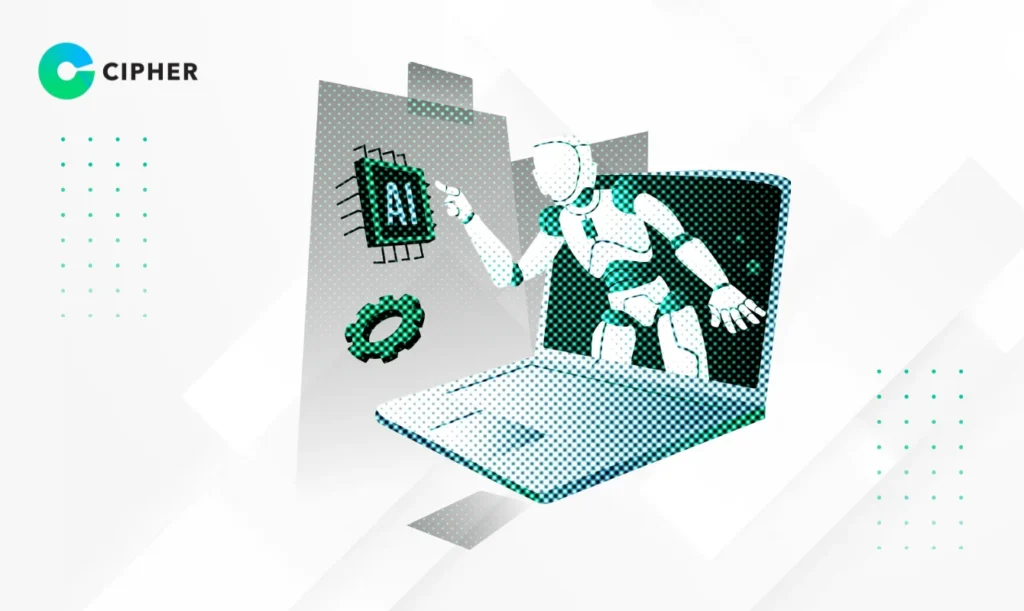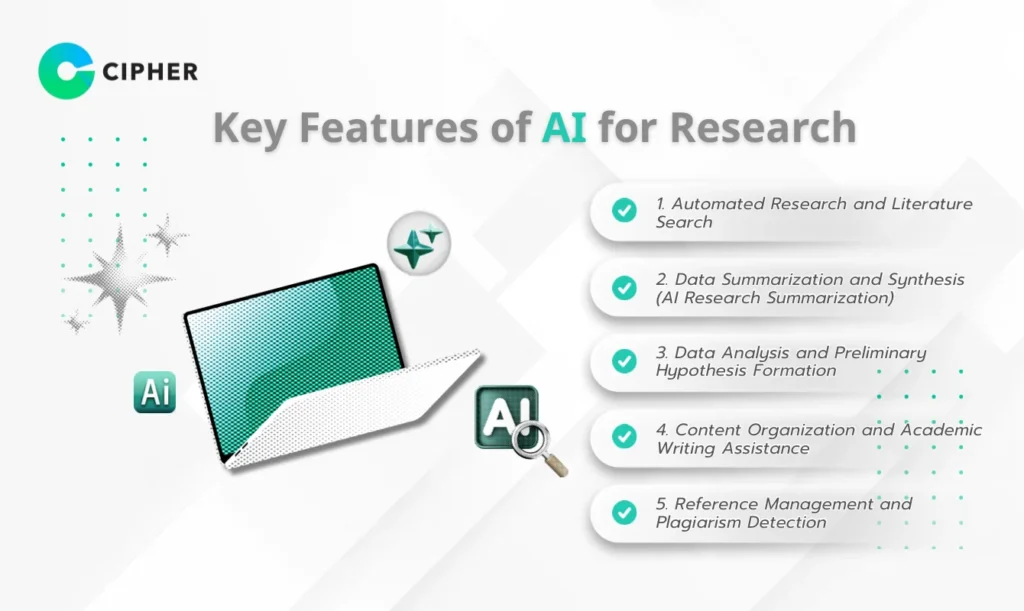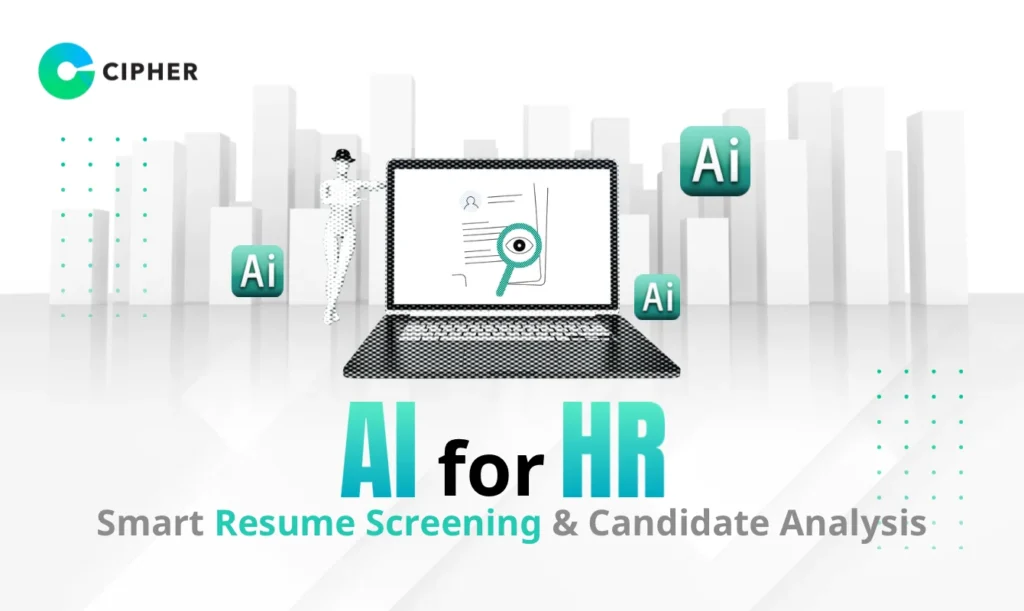Today, Human Resources (HR) departments are no longer just responsible for hiring and payroll processing. They have become a crucial factor in driving organizational growth. Amid the challenges of finding and retaining talented individuals, implementing AI for HR has become an essential tool that shouldn’t be overlooked.
This article will introduce you to AI in HR Functions that help HR departments work more efficiently, especially in resume screening and preliminary candidate analysis. We’ll also recommend interesting AI Software for Human Resources from CIPHER, experts in AI development that meets the needs of modern organizations.
Table of Contents
What is AI?

What is AI? Artificial Intelligence refers to machine intelligence created for non-living entities. It’s a technology capable of performing automated tasks similar to human capabilities, with the potential to learn and process large amounts of data quickly and accurately. AI can solve problems without requiring detailed software programming by learning from pattern analysis of vast amounts of data.
In today’s business world, AI for Work isn’t just a passing trend. It’s a technology that will transform how every organization operates, including human resource management.
Why AI is Suitable for Human Resources (HR)
If you’ve worked in HR, you understand that each day involves dealing with numerous documents—whether screening hundreds of job applications, monitoring employee performance, managing benefits information, or planning training programs. These tasks are time-consuming and resource-intensive.
HR Tech, or the use of technology in human resource management, is becoming a powerful trend because AI technology can address these challenges precisely. With its ability to process large data sets quickly, provide accurate analysis, and perform repetitive tasks, HR professionals can focus more on strategic work that creates value for the organization.
Furthermore, in this competitive era, organizations that can select and attract the right people faster gain a competitive advantage. AI Resume Screening can help you outperform competitors in this regard.
How AI Helps HR Work?

1. AI for Preliminary Personnel Screening
The recruitment process is time-consuming and high-risk. How to Use AI for HR in Resume Screening can make this process more efficient by:
- Fast Resume Analysis: AI can process numerous applications quickly, eliminating the need to read each one manually.
- Keyword Screening: The system searches for keywords and skills that match the job position, ensuring candidates have the required qualifications.
- Reduced Selection Bias: AI makes decisions based on data and defined criteria, not personal feelings, making the selection process fairer.
- Candidate Background Checks: AI can gather information from various sources, such as social media, to provide a complete picture of the candidate.
- Automatic Candidate Ranking: Ranks candidates according to their suitability for the position, helping HR see the overview clearly.
Examples of interesting tools include Talentify AI and XOR AI, which help screen candidates efficiently and quickly.
2. HR Uses AI for Employee Training
Personnel development is a key to enhancing organizational potential. AI for HR can help elevate training through:
- Creating Personalized Courses: AI analyzes the strengths and weaknesses of each employee to offer appropriate learning plans.
- Automatic Orientation: Creates comprehensive and efficient onboarding systems, helping new employees adapt faster.
- Progress Tracking: Monitors how employees learn and perform on tests.
- Training Notifications: Sends alerts when it’s time for training or when interesting new courses are available.
- Training Evaluation: Analyzes whether training affects actual work performance.
Tools like FlipHTML5 help create interactive training manuals and efficiently track employee progress.
3. AI Improves Efficiency and Quality in Work
Daily HR tasks are often filled with repetitive administrative work, making AI Software for Human Resources useful in elevating work efficiency by:
- Automatic Meeting Scheduling: AI helps coordinate and schedule inter-departmental meetings efficiently.
- Important Event Notifications: Sends alerts about meetings, important schedules, or various deadlines.
- Answering Basic Questions: AI Chatbots can answer common employee questions 24 hours a day.
- Automatic Document Management: Helps create, manage, and store important documents systematically.
- In-depth Data Analysis: Summarizes important information from various sources to aid decision-making.
Implementing AI for these tasks allows HR to devote time to work that truly requires human skills, such as counseling or strategic planning.
4. AI Helps Retain Employees and Understand Employee Behavior
Retaining talented individuals is a significant challenge for every organization. AI for HR helps with this by:
- Predicting Resignation Trends: AI analyzes behaviors such as absences and tardiness to predict resignation trends.
- Satisfaction Monitoring: Creates surveys and analyzes employee satisfaction in real-time.
- Career Path Planning: Helps create career paths suitable for each employee, showing growth opportunities within the organization.
- Recommending Employee Motivation Methods: Analyzes how each employee responds to different types of motivation.
- Identifying Problems Before They Escalate: Detects signs of issues in teams or departments for timely resolution.
Tools like Peakon or Culture Amp use AI to analyze employee satisfaction, helping to better understand their needs and expectations.
5. AI Processes Employee Data
Managing employee data is important but time-consuming. AI in HR Functions helps make this task easier with:
- Automatic Time Recording: Automatic time-in and time-out systems that are accurate and prevent fraud.
- Online Leave Management: Employees can submit leave requests and managers can approve them conveniently through the system.
- Accurate Salary Calculations: Reduces errors in calculating salaries, taxes, and various benefits.
- Efficiency Analysis: Evaluates work performance based on actual data, not personal feelings.
- Digital Document Management: Stores and searches for documents efficiently, reducing paper use.
Programs like Human OS or BambooHR are examples of systems that use AI to comprehensively manage employee data, making HR work more efficient.
AI Tools That Meet HR Work Requirements
1. AI Automatically Extracts Data from Documents
2. AI Facial Recognition
Security in entering and exiting the workplace is important, but traditional systems using employee cards or fingerprint scanning may have limitations, especially in an era when contact should be minimized.
AI facial recognition systems allow employees to enter and exit the office conveniently and safely without touching any equipment. They also help reduce fraud, such as friends scanning employee cards to check in for others.
3. AI Manages and Searches for Information Within the Organization
Every organization has vast amounts of data, including employee information, policies, regulations, or various important documents. Storing and searching for this information efficiently is a challenge for every organization.
AI-Knowledge Management systems make managing and searching for information convenient and fast. Simply by uploading document files, website links, or Q&A into the system, AI will automatically process and extract information, making information retrieval easier, whether through keyword searches or Q&A.
4. AI Chatbot
HR often has to answer repetitive basic questions from employees, such as about benefits, holidays, or document request procedures. AI Chatbots can substitute for HR in answering these basic questions 24 hours a day, ensuring employees get the information they need immediately and allowing HR to focus on more valuable work.
Additionally, Chatbots can help conduct satisfaction surveys, announce important news, or even help employees fill out various forms.
CIPHER: Experts in AI for HR and Organizations
Implementing AI for HR in your organization may seem like a big task, but with the right guidance and support, the transition to the AI era can be smooth.
CIPHER is a leader in IT Solutions and Digital Marketing with expertise in applying AI to various tasks, including HR. With a team experienced in working with leading organizations in both the public and private sectors, CIPHER understands the challenges and needs of modern HR very well.
CIPHER’s services aren’t just about programming but include process analysis, system design, and developing solutions that truly meet organizational needs, such as:
- AI resume screening and preliminary candidate assessment systems
- Personalized training and personnel development platforms
- Data analysis systems to predict resignation trends and help retain employees
- Automatic employee question-answering chatbots
- AI document and organizational information management systems
Conclusion
AI for HR isn’t just a hot trend but a necessity for organizations that want to survive and grow in the digital age. Implementing AI Resume Screening and other technologies helps HR work more efficiently, reduces repetitive routine work, and allows focus on strategic work that creates value for the organization.
Starting to use AI in HR doesn’t have to be difficult or complicated. You can start with small aspects, such as using AI to help screen resumes, and gradually expand to other areas as you see positive results.
CIPHER is ready to be your partner in helping you implement AI Software for Human Resources efficiently, meeting your organizational needs, and helping you stay ahead of competitors in the rapidly changing business world. Start transforming your HR department with AI today.
Frequently Asked Questions
What is AI for HR?
How Accurate is AI Resume Screening?
What are the Benefits of Using AI in HR?
Using AI for HR makes human resources work more efficient, such as:
- Saving time in screening applicants
- Reducing bias from human selection
- Helping analyze employee data for accurate planning
- Answering employee questions automatically with Chatbots
- Enhancing the employee experience at every step





